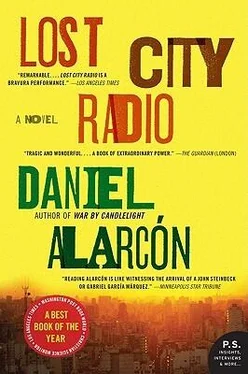Manau nodded. The bus emptied, and still they stayed put. I’ll make him move me, Victor thought. All he wanted was to sleep, to dream of places he had left behind, of his mother letting go, of rivers and people as transparent as ghosts.
The bus driver lumbered down the aisle and informed them they had arrived.
“We’re aware,” said Manau.
“You two got somewhere to go?” the driver said. He glared like an animal.
“We’re getting off.”
“Good,” he said. It was clear he didn’t believe them.
Then Manau’s hands were on Victor’s back, ushering him through the bus and out the door. What if he had said no? No, I’m not getting off. No, send me home. There’s nothing for me here. My father is a phantom and my mother is floating on the river, halfway to the sea by now. Maybe it wouldn’t have been different at all. Maybe—
They stood on the sidewalk for a moment. Manau was almost smiling. Of course he was: he was home. Victor had imagined approaching a city gentleman, a man in a top hat and severe black suit, and asking, “Which way to the radio, good sir?” He didn’t have to. It was there ahead of them, an antenna piercing the sky.
NOW THE street had filled, and he was surrounded by a hot and panting mass of strangers. Victor buried his face beneath Norma’s arm, closed his eyes, and willed the moment to pass. The white-haired man had disappeared, and the woman, too, both absorbed by the rushing crowd. Victor breathed Norma’s city smell, the scent of acrid smoke on her clothes, and felt her heart beating. Was she afraid too? Voices rose around him, urgent human sounds, the heat of shouted prayers, calling Norma, Norma, Norma! And so it was everywhere, he thought, this worship of her. Not just in my faraway village, but here too, in the central city, in the capital. He looked at the people, at the dark forest of men and women. There was no way out except through them. Norma was warm, but he could feel her body tense. He had brought all this on, this rush of needy pleas, of outstretched hands fingering tiny, faded photographs — all of this, by simply saying her name. A bearded man pressed closer, wailing toothlessly, his hands caressing an unseen figure as he repeated a name again and again. There was something pained in his eyes. He wore too-small rubber sandals, his toes pushing out beyond the soles, grazing the dirty pavement. He looked sicker than the man with the X-rays, closer to death. Victor could see their insides. The people were upon them, tangled and anxious; and suddenly they were moving, Norma holding him tightly, Victor unwilling to let go.
The white-haired man appeared and whistled again. He waved his arms frantically, and then, quite unexpectedly, there was silence. “Form a line,” he ordered. The crowd thinned and spread and organized itself. Victor felt he was watching a choreographed dance. He looked up at Norma: she was pale and tense and afraid.
A moment later, a table and two chairs had been arranged for them. The line of people snaked down the block. A hundred eyes were upon them. It seemed they had no choice but to sit. The white-haired man apologized to Norma and Victor.
“What’s going on?” Norma asked. “I can’t.”
“One name per person!” the white-haired man shouted. “No more! No cutting in line or you’ll lose your ration card!”
He turned and smiled at Norma. “I’ll begin, if you please, madam.” He closed his eyes. “Sandra. Sandra Tovar.”
Someone passed Norma a pen and a piece of paper. She looked at the page and back at the white-haired man, saying nothing.
“Aren’t you going to write it down?”
Norma blinked.
“I’ll do it,” Victor said.
“Can you?” Norma lowered her voice. “Can you write ?”
He nodded and took the pen. “Sandra Tovar,” the white-haired man said again, and Victor wrote the name carefully. The man thanked them both and stepped to the side with a bow.
Victor took dictation. The line moved slowly: each person stood before Norma, patted Victor on the head, and uttered a single name. They lingered, each of them, until Victor had written the name out and Norma had checked it. She thanked them in a tired voice, offered her condolences. She promised to read the name on the air. A few names she had to spell for him, and for those moments, it seemed he was in school again, back home where nothing had changed. The chatter of the people became the sound of rain in the forest. And so it was all a nightmare; perhaps he had never left the village. He filled a page without thinking. He kept his head down, his eyes on the paper, on these names, on his own hand carefully tracing letters.
Then: “Adela.”
He’d been at it for twenty minutes when he heard his mother’s name. Victor looked up to see a thin, unshaven man holding a knit cap in his hands. Victor thought for a moment he must know the man, that the man must know him, that his two-day journey was over, that there was some sense in all this. Victor put the pen down. He noticed for the first time that it was night.
“Adela,” the man said again in a low voice. He began spelling it.
“I know how to write it,” Victor said. How could he not?
“What manners!” a woman in line said.
“Do you know her? Do you know my mother?”
The man frowned. “Who are you, boy?”
Victor felt suddenly light-headed. It wasn’t his mother at all. It couldn’t be: how many Adelas were there? He heard Norma ask if he was all right. Through nearly closed eyelids, he saw the man put on his knit cap and walk away quickly.
“Victor?”
He leaned over and threw up beneath the table. Then there was a commotion. “Don’t hold up the line!” a voice called. “Move the child!”
Someone handed Victor a glass of water. They were surrounded again. How long had they been there? The white-haired man was yelling, but this time no one was listening. Norma had him in her arms. “We’re going,” she whispered to Victor. “We’re going. Can you stand?”
He nodded. He was wobbly on his feet, but he managed.
The crowd parted, but they let their fingers graze over Norma as she passed — light, inoffensive touches, hopeful touches, as if she were an amulet or the image of a saint. Their hands washed over Victor as well. There was noise, shouting, an engine backfiring. The crowd swelled. It was impossible to tell how many people there were, or where they had come from. They towered over Victor and blotted out the sky. He wanted to tell Norma that he was sorry. He cowered. The people loved her, and he understood this. They called her name. They would never hurt her. He was safe.
Victor and Norma escaped the crowd through narrow alleys and crooked paths, the noise and the people fading with each step. The dirt beneath their feet was packed hard, cut by tiny streams of water drawn on the path like a system of veins. The farther they got from the crowd, the faster they went: soon they were running, Norma ahead, Victor doing his best to follow. His palm stuck to hers, his heart raced, and then they had emerged in a wide, desolate plaza graced with palm trees, lit by orange streetlamps. The buildings were ornate and self-important, but the fountain at its center was dry and gathering dust. An Indian woman sat on the curb, stooped over a coloring book, an infant asleep in her lap, and she didn’t even look up at them. A lone soldier stood watch in front of one of the buildings, rocking back and forth on either foot, machine gun at his side.
Norma and Victor waited a few minutes, catching their breath, not speaking. A man tipped his hat as he pedaled his creaky bicycle across the plaza. It was night, Norma told him, and the city lived indoors at these hours. “It’s all these years of curfew. We’re accustomed to it now.” It didn’t look at all like the same place Victor had seen that morning. The people had vanished. After a while, a cab rolled by, tapping its horn lightly, and Norma stopped it with a wave of her arm. They rode silently across the city, Victor with his face pressed against the window, his heart still beating raggedly. He was sure he saw them in every shadow: the lost and the missing, huddled on corners and in doorways, asleep on benches. The cabbie drove and tried to chat with Norma, but she seemed to be in no mood to talk. She kept her lips pursed tightly, only nodding or responding when decorum demanded it. The driver didn’t mind: he complained about his work, making a joke of it, his voice raspy and affected. “After a few hours,” the cabbie said, “I lose feeling in my legs.”
Читать дальше












